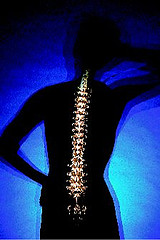 Here's a grab-bag full of interesting nutritional tidbits. As always, chew thoroughly before swallowing.
Here's a grab-bag full of interesting nutritional tidbits. As always, chew thoroughly before swallowing.
Sun and Supplements
Synergy is a terribly overused word, one of those very appropriate terms nearly trampled into nonsense by marketing. But synergy is exactly the right term for how one fights the risk of cancers, as shown by a recent study. According to the study, a combination of some sun exposure and vitamin D supplementation may be the most effective means of reducing the risk of breast cancer, as opposed to either one alone. If you are in the mood for some light reading, here is the report:
Source Surf and turf
It appears that there is a functional relationship between flavonoids, beneficial plant chemicals found in fruits and vegetables and omega-3 fatty acids, the type found in fish oil. A recent study demonstrates that flavonoids can actually help increase blood levels of omega-3 fatty acids thereby making these important polyunsaturated fatty acids more available for the body to use.
Omega-3 fatty acids are crucial for brain and heart health and are anti-inflammatory.
Examples of flavonoids, which possess antioxidant, anti-inflammatory and anti-cancer properties, include EGCg from green tea, quercetin from apples, citrus and onions and curcumin from the spice turmeric.
Source The Cardiac Surgeon's Savior
A recent medical study discovered that vitamin C can reduce the risk of experiencing a serious heart arrhythmia after heart surgery.
Atrial fibrillation is a common complication of heart surgery and increases the risk for longer hospitalizations and death. Vitamin C use, post-surgery, may significantly reduce the incidence of atrial fibrillation, according to the study.
Bad Breath, Strong Bones
Diets high in garlic and other related vegetables such as onions and leeks have been shown to reduce the risk of developing the bone weakening disease osteoporosis.
Diallyl disulphide, a compound found in garlic and other related vegetables, was shown to repress the expression of certain destructive enzymes that are linked with osteoarthritis, providing a potential mechanism of action for garlic’s effect.
Don't forget: Alternative medicine = scientific medicine.
Dr. Avery Jenkins is a chiropractic physician specializing in the treatment of people with chronic disorders. He can be reached at alj@docaltmed.com or by calling 860-567-5727.

 It appears that the medical community is about to foist yet another quack "cure" for osteoporosis on the women of this country. Prolia, the latest alleged treatment for osteoporosis, is an injectible that was approved by the FDA primarily on the basis of a single study paid for and conducted by the company that developed the drug.
Ok, let me repeat that one more time. The FDA has approved a dangerous (we'll get to that in a minute) drug on the basis of research that the developer bought. Not to put too fine a point on it, but government oversight of BP's woebegotten Deepsea Horizon was more stringent than this.
It appears that the medical community is about to foist yet another quack "cure" for osteoporosis on the women of this country. Prolia, the latest alleged treatment for osteoporosis, is an injectible that was approved by the FDA primarily on the basis of a single study paid for and conducted by the company that developed the drug.
Ok, let me repeat that one more time. The FDA has approved a dangerous (we'll get to that in a minute) drug on the basis of research that the developer bought. Not to put too fine a point on it, but government oversight of BP's woebegotten Deepsea Horizon was more stringent than this. The March edition of the Alternative Healthpod is now available. If you are not a subscriber, you can listen to it
The March edition of the Alternative Healthpod is now available. If you are not a subscriber, you can listen to it